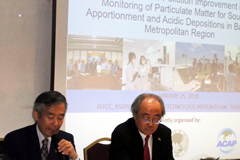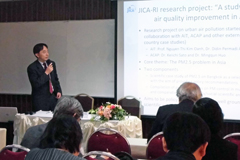Workshop on the Results of Observing PM2.5 in the Bangkok Metropolitan Region Held in Thailand
2018.02.19
On January 25, 2018, JICA Research Institute (JICA-RI) jointly hosted a workshop in Thailand with the Asian Institute of Technology (AIT) and Asia Center for Air Pollution Research (ACAP). The workshop was held to launch the final report on the results of fine particulate matter (PM2.5) measurements in the Bangkok Metropolitan Region, which was carried out as part of the JICA-RI, AIT and ACAP joint research project "Study on Urban Air Pollution Improvement in Asia." There were approximately 40 participants from Thai government agencies, such as the Pollution Control Department and Ministry of Transport, universities and international organizations.
In the opening address, Naohiro Kitano, JICA-RI director, touched upon increased global concern over air pollution. He said that targets related to improving air pollution have been included in the Sustainable Development Goals (SDGs), namely Goal 3 ("Ensure healthy lives and promote well-being for all at all ages") and Goal 11 ("Make cities and human settlements inclusive, safe, resilient and sustainable"). He also explained that this research project, which commenced in 2014, had two components: the observation of PM2.5 in the Bangkok Metropolitan Region and the comparative analysis of policy on PM control in various countries, including Japan, Korea and Mexico. Kitano expressed his expectations toward this workshop, stating that knowledge and policy implications based on research results would be widely shared. Kazuo Yamamoto, Vice President for Administration, AIT, said in his opening address that the control and management of air pollution are global issues and are being sought of all countries, highlighting the need to formulate evidence-based policies while sharing information and knowledge.

Naohiro Kitano, JICA-RI director (left) and Kazuo Yamamoto, vice president for Administration, AIT
Daiju Narita, JICA-RI visiting scholar, who is an associate professor at The University of Tokyo, described the outline of the joint study. He said that air pollution is not only a health problem but also an economic issue—lost labor time reduces the potential for economic growth, etc. He also pointed out that Thailand is facing the worrisome trends of an increase in welfare losses and of a rise in mortality rates resulting from air pollution. Narita said that among various airborne pollutants, Thailand should focus more on PM2.5 given the diversity of its sources. He emphasized that it is crucial to make societies more sustainable in order to tackle this issue. He pointed to the following as a major achievement of this study: the Bangkok Metropolitan Region has a PM2.5 concentration that exceeds the permissible annual average under Thailand's regulatory standards and the standards in World Health Organization (WHO) guidelines; Vehicular exhaust fumes and biomass burning were contributing greatly to PM2.5.

Daiju Narita, JICA-RI visiting scholar described the outline of the joint project among JICA-RI, AIT and ACAP
Furthermore, Narita also gave energy intensity (economic output per unit of energy) as an example of a policy indicator for the improvement of air pollution. Comparing the energy efficiency between 2002 and 2004 with that between 2012 and 2014, improvements could be seen in many countries. However, there was a worsening trend in the case of Thailand. He said that Thailand needs to implement fundamental environmental policies as well as stronger regulations. He proposed the two "I"s—that is, the granting of "Incentives" for changing people's lifestyles and shifting the industrial structure toward improvement of energy efficiency, and "Innovations" in technologies and infrastructure.
In the sessions that followed, Nguyen Thi Kim Oanh, Professor at the Department of Energy, Environment and Climate Change, AIT, gave a presentation on the levels and the composition of particulate matters in the Bangkok Metropolitan Region. She showed that new knowledge was gained through the recent observations: PM concentration in central Bangkok was not necessarily higher than PM concentrations in the suburbs. This was followed by Keiichi Sato, chief senior researcher at ACAP, who gave a presentation on the characteristics of atmospheric depositions of ionic and carbonaceous components in the Bangkok Metropolitan Region. Didin Agustian Permadi, senior researcher at AIT, was next, giving a presentation on the simulation of PM2.5 in the Bangkok Metropolitan Region using a 3D photochemical smog modeling tool. Hajime Akimoto, former ACAP Director-General and currently guest scientist at the National Institute for Environmental Studies, Japan, commented at each session from an expert perspective.
There were many engaging questions raised by workshop participants in relation to analytical data and sampling, indicating the great interest toward this research project.
Download the report here:

事業事前評価表(地球規模課題対応国際科学技術協力(SATREPS)).国際協力機構 地球環境部 . 防災第一チーム. 1.案件名.国 名: フィリピン共和国.

事業事前評価表(地球規模課題対応国際科学技術協力(SATREPS)).国際協力機構 地球環境部 . 防災第一チーム. 1.案件名.国 名: フィリピン共和国.

事業事前評価表(地球規模課題対応国際科学技術協力(SATREPS)).国際協力機構 地球環境部 . 防災第一チーム. 1.案件名.国 名: フィリピン共和国.

事業事前評価表(地球規模課題対応国際科学技術協力(SATREPS)).国際協力機構 地球環境部 . 防災第一チーム. 1.案件名.国 名: フィリピン共和国.

事業事前評価表(地球規模課題対応国際科学技術協力(SATREPS)).国際協力機構 地球環境部 . 防災第一チーム. 1.案件名.国 名: フィリピン共和国.
scroll